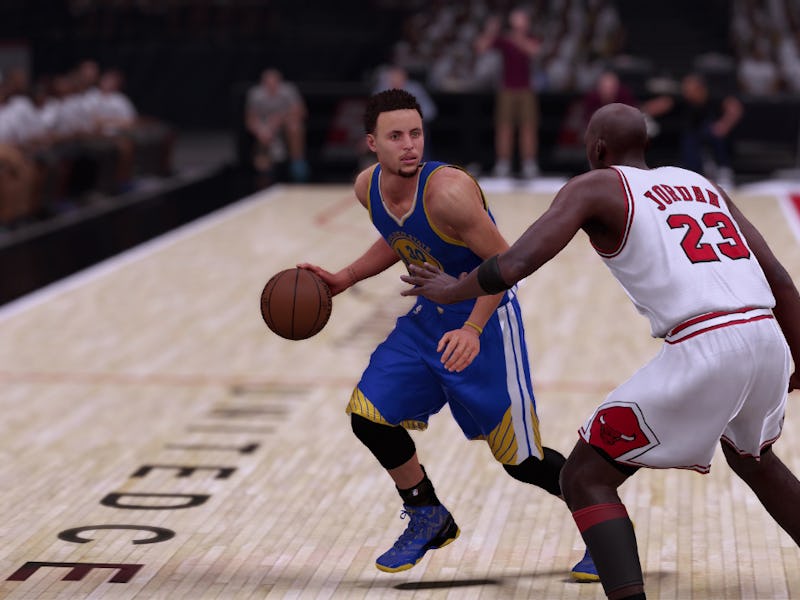Science Says Sports Video Games Are a Gateway to Playing Actual Sports
New research shows the more time you log in on the virtual court, the more time you'll spend on the hardwood IRL.

Turns out there may be one sedentary pursuit that actually does get people off their asses. In a recent study, researchers at Brock University in Canada found a positive connection between playing sports video games and playing sports in real life among older adolescents and emerging adults. Over a three-year period, study participants who played the most sports video games were more likely to get involved in real-life sports than their peers.
Now this is not an all-nerds-are-created-equal sort of thing; the positive correlation between gaming and physical activity seems to be unique to sports games. Other genres still tended to show a negative relationship to real-life activity. MMORPG players tended to be involved in fewer physical activities offline than non-video game players. Interestingly, the difference is not just a matter of developing an affinity for the sport itself, but something a little deeper. Moderate sports gamers, unlike players of other games, have been shown to develop higher levels of self-confidence in regards to physical activity and competition more broadly.
In an era where younger children are more frequently involved in sports that take the focus off of winning or losing, sports video games have proven to be a great teaching tool for older kids — especially those whose interest in sports has come later in their adolescence — when it comes to learning how to compete. Virtual sports gaming has some of the same psychological effects as its real world counterpart. Victory builds confidence, while experiencing defeat encourages learning and improvement.
That real life triangle button...
In the virtual world these lessons are learned in lower-stakes environments: “mistakes” are typically only seen by a few sets of eyes as opposed to an entire playground or gymnasium. This allows the player to mitigate anxiety and fears of embarrassment and ridicule associated with failure. The theory goes, @cryingjordan6969’s shit-talking via microphone in an anonymous, online environment actually helps his peers learn to deal with both adversity and losing, thus making them more confident competitors before they ever step onto a real-life field, court, or pitch.
A little trash-talking is a healthy part of competition
As video game technology continues to advance, players have to learn more about the real world sports in order to compete in the games. For example, Madden players have to fairly master IRL NFL offensive and defensive schemes, position roles, and situational strategies. Since there is always a game to be found online, players are able to get in huge amounts of reps, which means they are able to learn rules, strategy, and even mechanics much more quickly than they could on the playground.
An avid NBA 2K16 player will have a pretty good idea of proper jump shot mechanics or how a high pick and roll should work even if they’ve never dribbled a real basketball. So even if a young player’s real-world ratings are closer to Tim Curry than Steph Curry, they will have a sound theoretical knowledge of what they are doing, and the confidence to improve on the physical parts without such a deep fear of failure or ridicule.
Moving forward, there are still some questions as to whether the “sports games as a gateway to real life sports” theory is applicable to younger children or even adults. Also, there are some questions as to how cooperative game play (players on the same team vs. a computer opponent) have added or decreased benefit to self-esteem when it comes to teamwork. However, for the time being, sports gamers should rejoice in the knowledge that sitting in front of a screen all day has some tangible benefits after all.